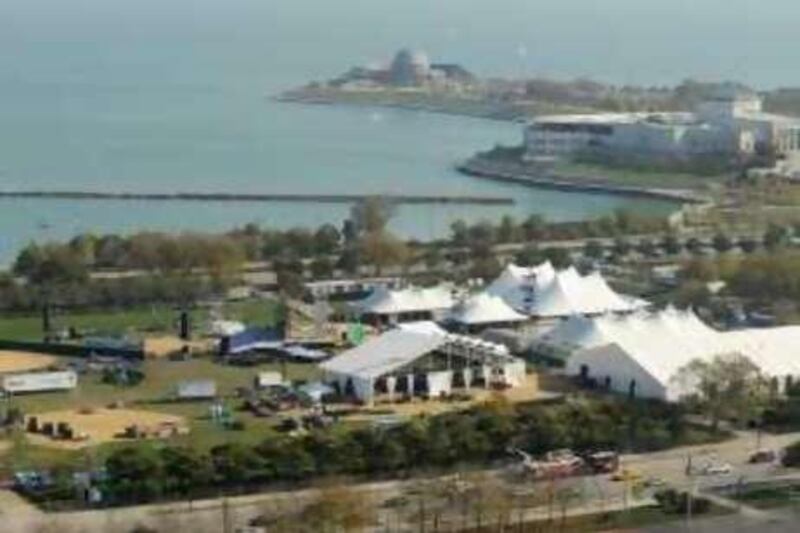CHICAGO // The city of Chicago is famous for deep-dish pizza, one of the all-time great basketball players, Michael Jordan, and the tallest building in the United States, the Sears Tower. These days it enjoys another distinction, as hometown of a man who might be president. Chicago - where Barack Obama has a house, where his children go to school and where his wife was raised - is not unaccustomed to big events. The city hosted a decadent and groundbreaking World's Fair more than a century ago and has staged more national political nominating conventions - more than two dozen - than any other US city. Lately, it has been deep into preparations for another considerable occasion. Tomorrow night, Mr Obama will return home after nearly two years on the campaign trail to deliver what will be either a victory speech, as the city hopes, or a concession, which would break its heart. As many as one million people are expected to head to Grant Park on Lake Michigan, often referred to as the city's "front yard", even though only 65,000 to 70,000 people will have tickets. "This is a celebration," Richard M Daley, the mayor, declared the other day, getting ahead of himself a bit. If overwhelmingly Democratic Chicago loves Mr Obama - and it does - that does not mean his rise has changed the character of the United States' third-largest city much. It was obsessed with politics well before he came along (and will be after he is gone). In some parts of the country, talking about your vote is taboo; here, it is odder if you keep quiet. "Chicago is a town that eats and sleeps and breathes politics," said Ben Calhoun, a political reporter for Chicago Public Radio who has covered Mr Obama. The election spirit is not hard to find. A Jewish deli called Max and Benny's has been selling cookies frosted in the likeness of the Democratic senator (John McCain cookies are available, too, though they do not sell as well). A local barber shop is offering a haircut known as "the Obama". Don Rose, a veteran Democratic analyst who has spent nearly all his 78 years in Chicago, has noticed something else when he is walking along the downtown streets: people seem friendlier. Passing someone wearing an Obama button or sticker, if you are wearing one, too, is reason for a nod or smile. Mr Rose has a friend with a black T-shirt that says "Howl for Obama" in silver letters - the acronym stands for Hip Old White Ladies - that is inevitably a conversation starter. "It's always been a Democratic city, but it has been a divided Democratic city," Mr Rose said of Chicago. "There's black versus white, [traditional Democratic] machine versus progressive. At this point, everybody is on the same page." Mr Obama adopted Chicago as his hometown in the 1980s when, at the age of 23, he worked as a community organiser in one of the city's public housing projects. It is the place he met his wife, Michelle, and where he launched his political career a dozen years ago. Chicago politics is a politics all its own. It is known for being rough, tumble and, all too often, corrupt (the city was once home to the mob boss Al Capone). Chicago earned itself the nickname as the Windy City not because of the brisk wind that blows in off Lake Michigan but because of the long-windedness of its earliest lawmakers or, some say, because of the empty promises many of them would make. Old-school "machine" politics is still alive and well. Chicago has had two sets of father and son elected to the position of mayor; the current mayor is the son of a former one. There is no doubt when Mr McCain has pointed out that his opponent is a "Chicago politician", he was not paying Mr Obama, or the city, a compliment. But here, Mr Obama is, quite simply, a kind of hometown hero. Mr Rose cannot help but use a sports analogy - if there is anything Chicago loves as much as politics it is sports - to describe the feeling in the city. People have been talking expectantly about Mr Obama in the run-up to the election, he said, the way they did when the Chicago Bears went to the Super Bowl in 1986 (caveat: the team won). Or when the Chicago White Sox, one of the two Major League Baseball teams here, went to the World Series three years ago (the Sox won, too). "It's a new championship season," he said. Grant Park, the site of tomorrow's rally, has played host to its share of historic events. In the summer of 1968, Vietnam War protesters and police clashed violently during the Democratic National Convention. In 1979, Pope John Paul II said mass there. When the Chicago Bulls won a string of national basketball championships in the 1990s, it served as the open-air stage for the celebrations. The city hopes that is what is in store tomorrow in honour of Mr Obama. "Chicago has had its powerful figures," Mr Calhoun said. "But to be potentially the epicentre of American politics all of a sudden and potentially in a historical context - if the country does elect the first black president and he's from the South Side - I think that's the kind of thing that can change self-identity." eniedowski@thenational.ae
Windy City cheers for hometown hero
The city of Chicago is famous for deep-dish pizza, one of the all-time great basketball players, Michael Jordan, and the tallest building in the United States.

More from the national





